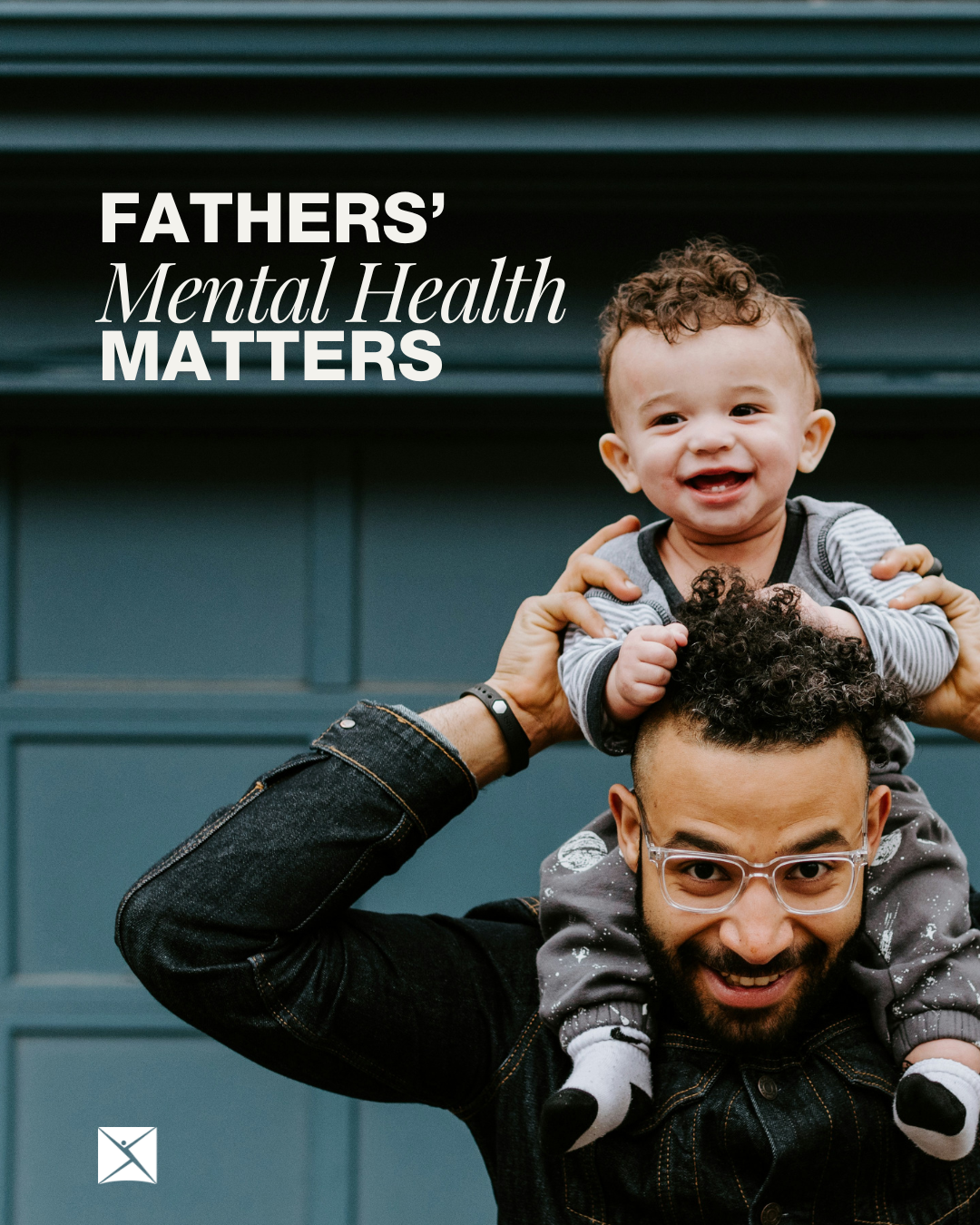The mental health of parents is vital for themselves and their families. Too often, parents neglect their own needs for the sake of their children. Thankfully, in recent years, there have been significant strides in addressing the mental health of mothers. There is still a lot of work to do – including bringing the mental health of fathers into the conversation. This Father’s Day, CMHA North Bay and District is shining the spotlight on the state of mental health among fathers and resources that are available.
The mental load of parenthood is challenging. For fathers, some of the most common stressors include:
- Stressful or traumatic pregnancy or labour
- Health concerns for their children and partner (particularly a birthing partner)
- Financial responsibility
- Rapid return to work
- Loss of intimacy with their partner
- Feelings of isolation
- Feelings of disconnect from their child or children
- Feelings of inadequacy or fears of being a bad parent
The impact of these stressors is considerable. Recent studies suggest that the prevalence of paternal postpartum depression is as common as among mothers.[1] As many as 5-15% of fathers experience post-natal anxiety or depression.[2] More than 25% of new fathers experience depression within the first year of their child’s life, and the risk of suicide is greater than that of mothers.[3]
Despite this, according to the American Academy of Pediatrics, “a universally accepted and well-validated diagnostic tool for screening for paternal [postpartum depression (PPD)] is lacking. This absence is representative of the larger problem of insufficient research on paternal PPD.”[4]
After the birth of their children, fathers – and other non-birthing parents – experience a similar shift in their hormones and brain function that birthing parents and mothers do.[5] The risk of anxiety and depression is compounded by these changes and a lack of time off after birth – time that is essential for recovery and proper bonding. Although parental leave in Canada has been extended to provide five weeks for fathers, there can be several reasons why they do not take time off. The financial strain of two parents taking leave is often too great for Canadian families. Fathers may also be concerned about how taking parental leave will be perceived. A recent survey found that half of Canadian fathers felt their jobs would be negatively impacted by taking parental leave. Twenty-eight per cent said they feared being judged by friends, family, co-workers and even their partners if they took parental leave.[6]
There are many options available to fathers and all parents to help address and overcome their mental health challenges to create the best possible environments for their families. Here are a few tips for minor and temporary struggles. (If you are suffering from postpartum depression or anxiety, please reach out to your healthcare provider immediately.)
- Take time away from work in the first weeks after birth if possible. Taking time off will help you to recover as well as support your partner and bond with your child.
- Rely on your village. Reach out to your family and friends for help to make time for yourself and for you and your partner.
- Do your best to stay active, eat well and take care of yourself
- Try bonding with your child by feeding them, doing tummy-time, playing with them, reading to them, and taking them on outings.
- Rest when your child is resting
- Talk with your partner and doctor about any struggles you are having
Resources:
- While the North Bay Parry Sound District Health Unit does not offer father-specific screening or resources, it provides programs like Healthy Babies Healthy Children to help develop confidence in parenting skills.
- Parenting resources can be found through the North Bay Parry Sound District Health Unit:
-
- Listen, Respond, Connect (info & video): Parenting – North Bay Parry Sound District Health Unit (myhealthunit.ca)
- Help Your child recognize their emotions (info & video): Parenting – North Bay Parry Sound District Health Unit (myhealthunit.ca)
- Let your child play (info & video): Parenting – North Bay Parry Sound District Health Unit (myhealthunit.ca)
- Take care of yourself (info & video): Parenting – North Bay Parry Sound District Health Unit (myhealthunit.ca)
- Local playgroups and activities are an excellent way to maintain healthy socialization for children and parents. Some options in North Bay include:
-
- EarlyON Centre (playgroup is free)
-
- YMCA
- Blossom Early Learning (has a Daddy & Me class)
- Dad Central has many resources including articles, printable reference guides, a podcast, Facebook group and more.
- Fatherly is a popular media site specifically geared toward fathers. It offers fathering tips, celebrity interviews, parenting trends, and more.
If you or someone you know is experiencing a mental health crisis, contact Crisis Intervention at 1-800-352-1141 (24/7, Nipissing and area).
To learn about CMHA North Bay and District’s various programs and services and how they might be able to help you, visit nbd.cmha.ca or call 705-476-4088.
Works Citied:
Brenner, G. H. (2021, December 31). What Postpartum Depression Looks LIke in New Dads. Retrieved from Psychology Today: https://www.psychologytoday.com/us/blog/psychiatry-the-people/202112/what-postpartum-depression-looks-in-new-dads
Charles Schaeffer, P. (2016, March 22). The Mental Health of Dads Matters. Retrieved from Psychology Today: https://www.psychologytoday.com/us/blog/women-s-mental-health-matters/201603/the-mental-health-dads-matters
Darwin, Z., Domoney, J., Iles, J., Bristow, F., Siew, J., & Sethna, V. (2021). Assessing the Mental Health of Fathers, Other Co-parents, and Partners in the Perinatal Period: Mixed Methods Evidence Synthesis. frontiers in Psychiatry, 2.
Stechyson, N. (2019, March 15). Canadian Dads Can Take 5 Weeks of Shared Parental Leave. Here’s Why They Should. Retrieved from HuffPost: https://www.huffpost.com/entry/new-parental-leave-dads-canada_l_61087500e4b0497e67026eb8
Tova B. Walsh, P., R. Neal Davis, M., & Craig Garfield, M. (2020, January). A Call to Action: Screening Fathers for Perinatal Depression. Pediatrics Perspectives.
[1] (Brenner, 2021)
[2] (Darwin, et al., 2021)
[3] (Charles Schaeffer, 2016)
[4] (Tova B. Walsh, R. Neal Davis, & Craig Garfield, 2020)
[5] (Charles Schaeffer, 2016)
[6] (Stechyson, 2019)

